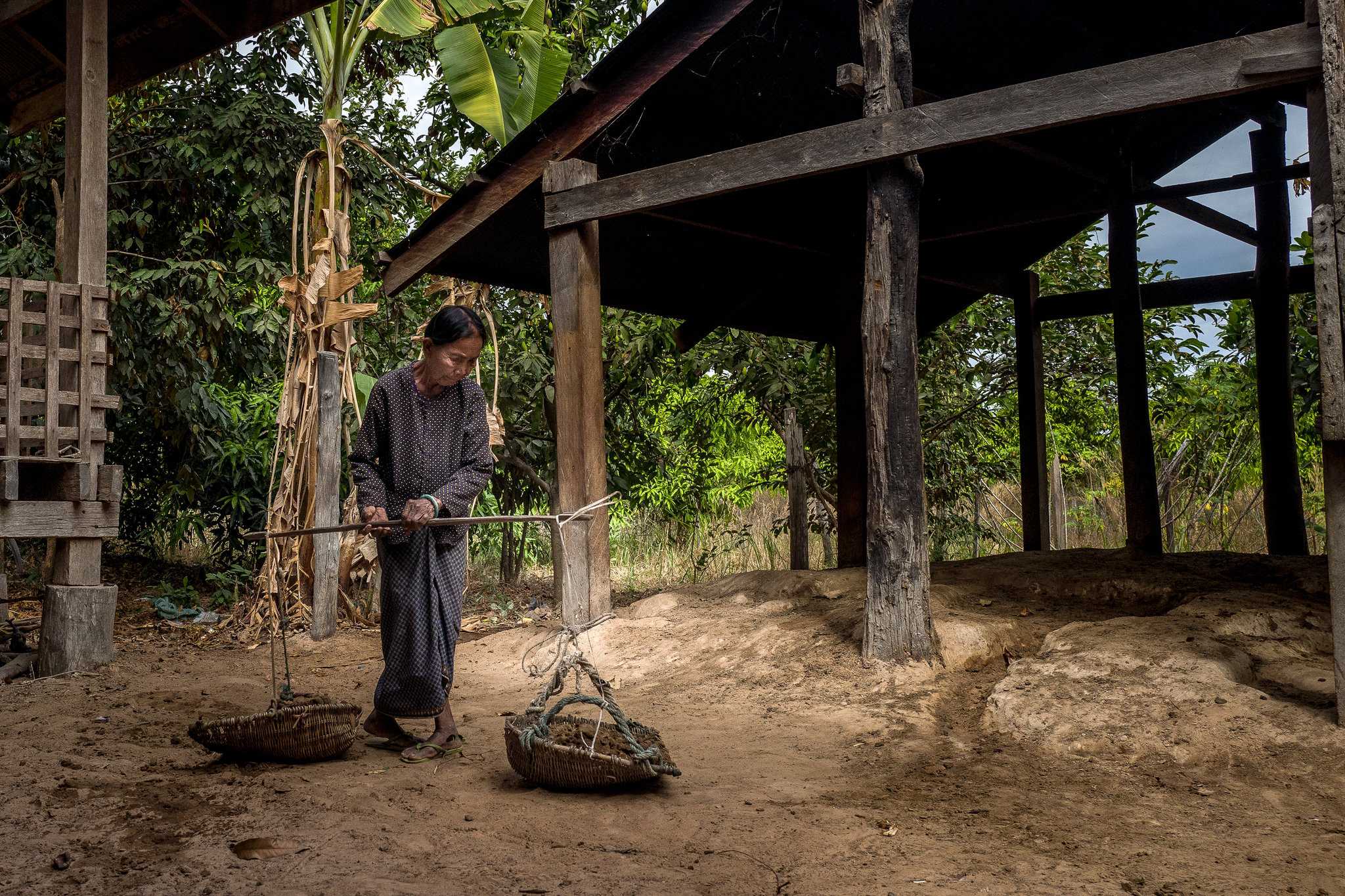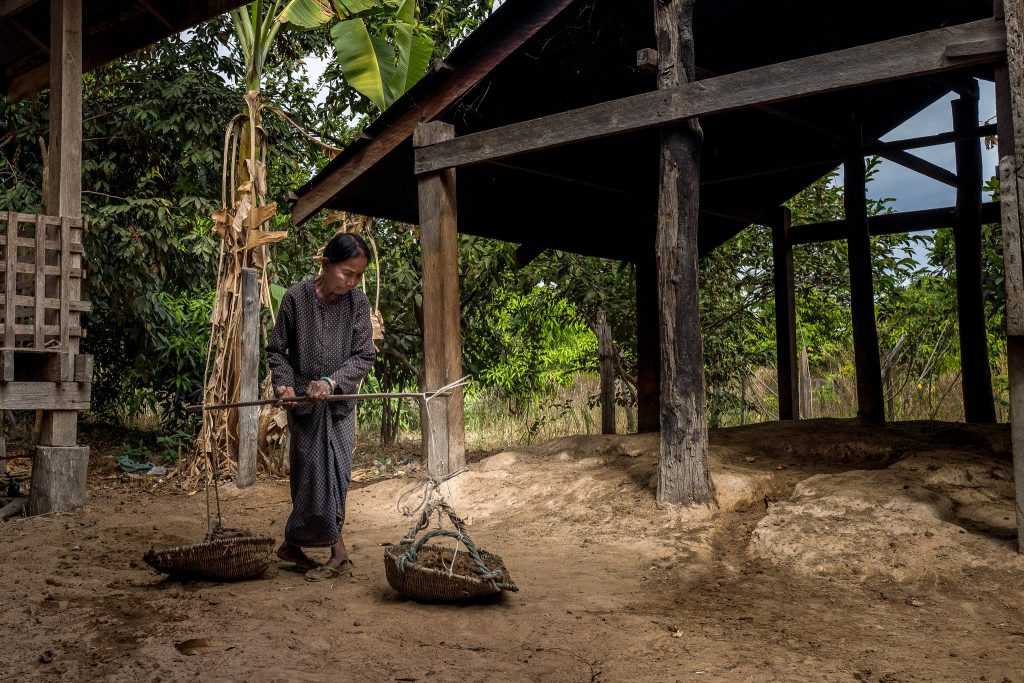
ANLONG VENG, Cambodia — In this dusty mountain hamlet on the Thai border, she is known as Grandma Chaem.
The tiny 74-year-old lives peacefully in a snug, stilted house surrounded by papaya, lime and custard-apple trees.
Her children and grandchildren live nearby. She grows cucumbers and donates to her local pagoda, chews betel leaf and tends her cows.
But Im Chaem, the woman enjoying this apparently idyllic retirement, is accused of overseeing the killing of tens of thousands of people as a Khmer Rouge official in northwestern Cambodia in 1977 and 1978. In 2015, a United Nations-backed tribunal charged her with crimes against humanity, including mass murder, extermination and enslavement.
On Wednesday, the tribunal’s investigating judges quietly dropped the charges, raising questions about whether they had yielded to pressure from the Cambodian government, which opposed the prosecution.
The tribunal, set up to try those accused of being responsible for the worst crimes committed during the nearly four years that the Khmer Rouge ruled Cambodia, is a joint project of the United Nations and the Cambodian government. The government, however, has fought efforts to prosecute anyone beyond the Khmer Rouge’s senior leaders and one notorious prison chief.
ANLONG VENG, Cambodia — In this dusty mountain hamlet on the Thai border, she is known as Grandma Chaem.
The tiny 74-year-old lives peacefully in a snug, stilted house surrounded by papaya, lime and custard-apple trees. Her children and grandchildren live nearby. She grows cucumbers and donates to her local pagoda, chews betel leaf and tends her cows.
But Im Chaem, the woman enjoying this apparently idyllic retirement, is accused of overseeing the killing of tens of thousands of people as a Khmer Rouge official in northwestern Cambodia in 1977 and 1978. In 2015, a United Nations-backed tribunal charged her with crimes against humanity, including mass murder, extermination and enslavement.
On Wednesday, the tribunal’s investigating judges quietly dropped the charges, raising questions about whether they had yielded to pressure from the Cambodian government, which opposed the prosecution.
The tribunal, set up to try those accused of being responsible for the worst crimes committed during the nearly four years that the Khmer Rouge ruled Cambodia, is a joint project of the United Nations and the Cambodian government. The government, however, has fought efforts to prosecute anyone beyond the Khmer Rouge’s senior leaders and one notorious prison chief.
The case was dismissed, the tribunal said in a statement, because Ms. Im Chaem “was neither a senior leader nor otherwise one of the most responsible officials of the Khmer Rouge regime.”

Ms. Im Chaem said she had never planned to go to court anyway.
“I do not like what they accuse me of,” she said in a recent interview at her home in Anlong Veng, a former Khmer Rouge stronghold. “I don’t want to think about that. There’s no reason for it. I don’t want to have any trouble. I just want to live in peace.”
As many as 2.2 million people died in Cambodia during the Khmer Rouge rule, and there have been battles over whom to prosecute since the tribunal’s inception. Since it opened in 2006, the tribunal has convicted only three people: two senior leaders and the regime’s chief jailer.
A fourth elderly suspect died during prosecution, while another was declared unfit for trial because of dementia. Three midranking suspects are also under investigation but have not been arrested.
The government — whose nucleus is a group of former Khmer Rouge officials and soldiers who defected early on — has effectively blocked the tribunal from reaching further into the ranks of the Khmer Rouge, many of whom gained positions in the army or local government when they agreed to reintegrate in the 1990s.
Prime Minister Hun Sen, a former Khmer Rouge soldier, has repeatedly warned that more trials would cause fresh outbreaks of civil war and chaos.
A United Nations prosecutor, Nicholas Koumjian, said in a December statement that “Im Chaem played a key role in the commission of crimes which led to many thousands of deaths,” and that she clearly fell under the court’s purview.

Anne Heindel, a co-author of “Hybrid Justice,” a book about the court, said the dismissal of the case was hard to understand in light of the evidence.
“What a farce and pretense of justice to spend so much money convicting only the three — a foregone conclusion — while pretending that the process was independent and not limited by politics for a decade,” Ms. Heindel wrote in an email.
The tribunal has cost the United Nations and international donors about $300 million so far.
According to a confidential document submitted by prosecutors in 2008, Ms. Im Chaem and another official, Yim Tith, were sent to the country’s northwest in 1977 to purge cadres seen as traitorous, often because they could not meet the regime’s hefty rice quotas with their starving labor forces and primitive technology. They killed many others along the way, collateral damage in the quest to enforce a radical communist vision.
Together, they may have been responsible for as many as 560,000 deaths, the prosecution document said.
Prosecutors estimated that 40,000 people had died at the largest prison in the district that Ms. Im Chaem ran, Phnom Trayoung, which was allegedly under her direct control. Some were executed by night, while others died doing heavy labor at the prison’s quarry while eating meager rations of rice porridge.
An entire village of 400 people, Chakrey, was virtually eliminated; fewer than 10 men were alive by the end of 1978. At a nearby jail, around 6,000 people were killed, 20 or 30 every night.

“In Chakrey village we could hear the screams from the forest nearby,” said one survivor cited in “The Pol Pot Regime,” a book by the historian Ben Kiernan. “The victims’ clothes were distributed to us the next day.”
Ms. Im Chaem also supervised construction of huge waterworks to increase rice production, including two dams. According to prosecutors, one was built entirely by hand in three months by 1,300 slave laborers subsisting on tiny portions of rice porridge.
She tells the story differently. In a 2012 interview with the Documentation Center of Cambodia, an independent research group, she said she had been called upon to “solve problems” because she had a knack for organizing workers and supervising rice cultivation. She said that poor conditions were endemic before she arrived in the area, and that she had improved things.
Thank you for subscribing.
An error has occurred. Please try again later.
You are already subscribed to this email.
View all New York Times newsletters.
Coincidentally, the head of the Documentation Center, Youk Chhang, labored under her command. At age 14, he was forced out of his home in the capital, Phnom Penh, and sent to the northwest, where he became a dam digger.
He said that conditions there had been brutal, and that workers had lived in fear of being killed.
“She forced us to work without food, without water,” he said. “For me, even though the court dismissed the case, the criminal remains the criminal until she is punished.”
Anlong Veng, about a seven-hour drive northwest of Phnom Penh, is dominated by a huge swampy lake, a defense around the last home of Ta Mok, the warlord known as the Butcher, who was Ms. Im Chaem’s direct superior.

The Khmer Rouge retreated here after the regime’s defeat and continued to hold sway until 1998. Today it is something of a retirement community for former Khmer Rouge fighters, and has recently filled up with S.U.V.s, hair salons and even a coffee shop selling cappuccinos.
Villagers emphasized that an important part of local culture was never to pry into other people’s pasts.
“Everyone knows Grandma Chaem, knows that she is living in this village, but we don’t know her background, what she did,” said Keo Khuot, 56.
He said that at one time, people who asked too many questions could have had their property seized or been “summoned for questioning” by Ta Mok and never come back.
Up the road, Ms. Im Chaem’s compound is the largest in her neighborhood, dotted with flowers and decorative cactuses and presided over by her eldest daughter, Kaing Rin, who keeps house. After dinners of fish or pork and homegrown vegetables, her family often sits down together to watch Thai soap operas.
Ms. Kaing Rin spent much of her childhood in a work brigade under Ta Mok in the Southwest Zone, the first part of the country to be forcibly collectivized. When her parents were sent to purge the northwest, they left her behind and did not see her again for over a decade. Four of her seven siblings died during those years.

Despite the privations of her youth, Ms. Kaing Rin mounted a spirited defense of Ms. Im Chaem.
“She can’t even kill a fish, so how could she kill a human being?” she asked.
Ms. Kaing Rin said her family’s patron, Ta Mok, was “only strict with bad people, people who made mistakes.” Her mother, she said, became a respected local leader for the governing Cambodian People’s Party after the disintegration of the Khmer Rouge in Anlong Veng.
“The people who accused her never saw her face,” Ms. Kaing Rin said. “Everyone who sees her face and knows her really loves her.”
Still, when asked where Ms. Im Chaem could be found, Ms. Kaing Rin claimed her mother was on a long journey and would not return for days.
In fact, Ms. Im Chaem was just down the road in a second home. Tipped off by a neighbor, journalists found her listening to Buddhist talk radio. She said she spent most of her time at the compound, cultivating cucumbers and melons, contemplating the scriptures and waiting to die.
“I just learn the Buddha’s advice and keep the holiness within myself for my own sake,” she said. “Having the holiness in myself makes me good, not killing anyone or criticizing anyone. That is the holiness in myself: to make myself good.”
Did she know all the crimes she was accused of: the murder, the slavery, the extermination? “You don’t need to ask me. You know it,” she shot back. “If you know it, you know it.”
At that moment, her husband arrived. Nob Nhem, 78, still wears the all-black uniform and red checked scarf of the Khmer Rouge, for whom he was also a district chief. He rarely speaks, but every time he appears, his family grows silent.
“I need to tend to my cows,” Grandma Chaem said, and slipped away.
We’re interested in your feedback on this page. Tell us what you think.




























